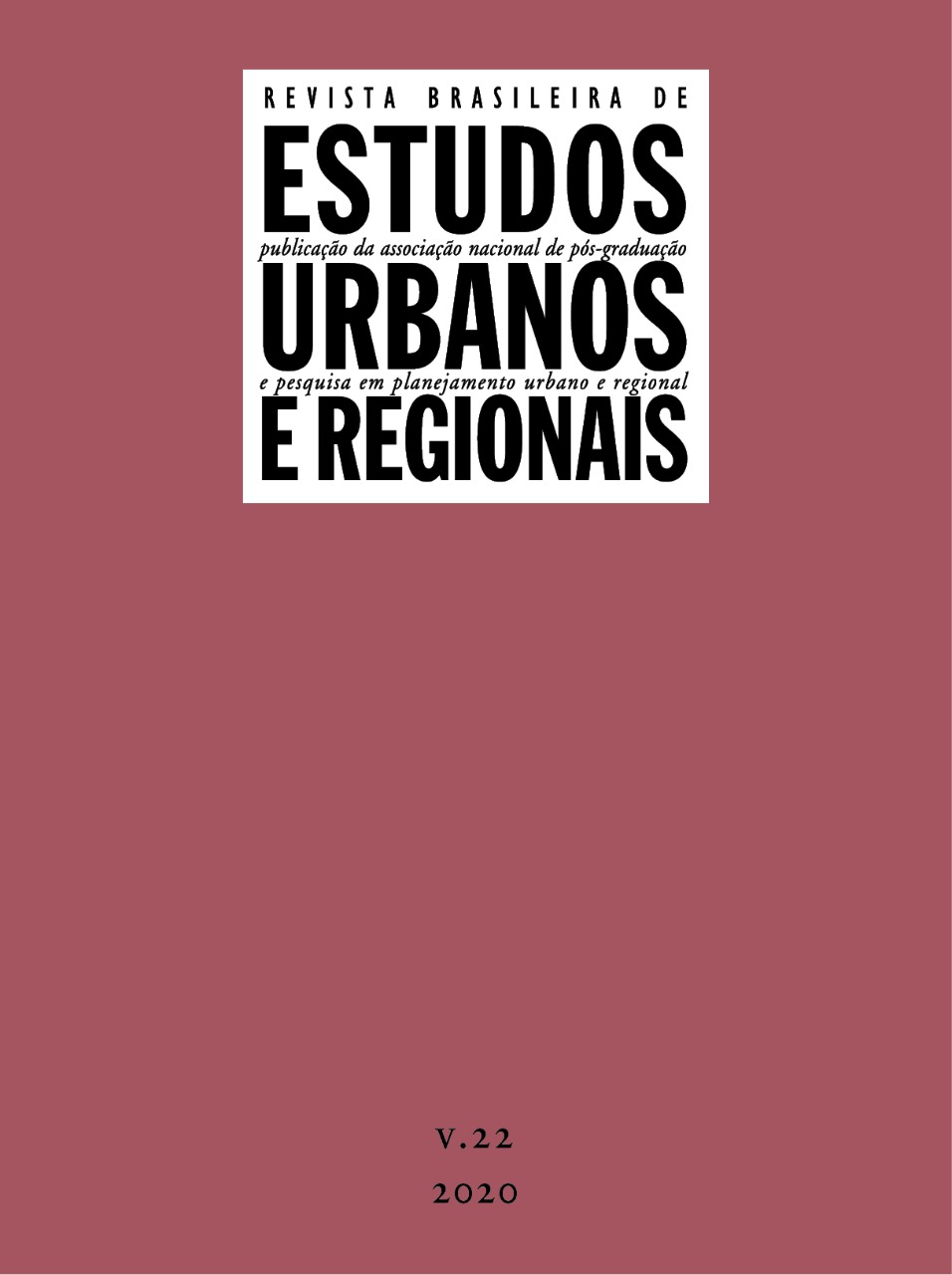The future of urban planning is in data from the present: the protection of privacy in the context of smart cities
DOI:
https://doi.org/10.22296/2317-1529.RBEUR.202003Keywords:
smart cities, personal data, privacy, public policy, urban planningAbstract
Cities around the world today deal with situations in which an ever-increasing amount of citizen-generated data is used for urban planning and management purposes, with the potential to stimulate citizen engagement and participation, to promote inclusion, and to make communities more efficient, liveable and just. At the same time, advances in the science of re-identification, trade of personal data, and big-time analytics bring with them concerns about the collection, use, sharing, and disposal of data, processes that must be surrounded by caution. As new technologies generate more data than ever before, how to seize the opportunities brought to the cities, while preserving individual privacy and building public confidence? What experiences have been brought by cities that have faced this challenge? And how can Brazilian cities navigate between data-use initiatives that bring benefits to citizens, such as resource savings and increased efficiency of city government, but which can come with a significant cost of privacy? This article seeks to explore these issues, discussing international and national cases, in which the tension between the growing use of data by the so-called smart cities and the protection of citizens’ privacy is present.
Downloads
References
Baldwin, R., Cave, M., & Lodge, M. Oxford Handbook of Regulation. Oxford University Press, 2010.
Bloomberg, Michael. Foreword. In: Stephen Goldsmith & Susan Crawford "The Responsive City: Engaging Communities Through Data-Smart Governance", 2014.
Chupadados, Coding Rights. Disponível em <https://chupadados.codingrights.org/com-o-riocard-seus-dados-passeiam-pelo-rj-e-ninguem-sabe-onde-vao-descer/>. Último acesso em 30 de maio de 2017.
Colab. Prefeito Dória anuncia a venda de dados dos usuários do Bilhete Único. Disponível em <http://colab.each.usp.br/?p=587>. Último acesso em 30 de maio de 2017.
Comitê Municipal de Uso do Viário. Disponível em: , último acesso em 2 de maio de 2017.
Diário Oficial da Cidade de São Paulo. Disponível em . Último acesso em 30 de maio de 2017.
Diário Oficial da Cidade de São Paulo. Disponível em: <http://www.docidadesp.imprensaoficial.com.br/NavegaEdicao.aspx?ClipID=DAI3AO1T7N876eCRKNJ38K9TP3A&PalavraChave=revoga > Último acesso em 20 de maio de 2017.
Estadão. Haddad diz que sigilo a dados da Uber e outras firmas é irregular e manda revogar resolução. Disponível em <http://sao-paulo.estadao.com.br/blogs/por-dentro-da-metropole/haddad-diz-que-sigilo-a-dados-da-uber-e-outras-firmas-e-irregular-e-manda-revogar-decreto />. Último acesso em 30 de maio de 2017.
Estadão. Total de carros da Uber e outros aplicativos supera número de taxistas em SP, diz Doria. Disponível em < http://sao-paulo.estadao.com.br/noticias/geral,total-de-carros-da-uber-e-outros-aplicativos-supera-numero-de-taxistas-em-sp-diz-doria,70001653256 >. Último acesso em 30 de maio de 2017.
Farah, Martha F. S. Parcerias, novos arranjos institucionais e políticas públicas no nível local de governo. RAP – Revista de Administração Pública, v. 35, n. 1, p. 119-145, jan./fev. 2001.
FATF, Money Laundering and Terrorist Financing through the Real Estate Sector (Paris: OECD, 2007), disponível em: , último acesso em 2 de maio de 2017.
Geosampa. <http://geosampa.prefeitura.sp.gov.br/PaginasPublicas/_SBC.aspx>, último acesso em 2 de maio de 2017.
Gestão urbana, Prefeitura disponibiliza base do IPTU em formato aberto no Geosampa, disponível em; <http://gestaourbana.prefeitura.sp.gov.br/noticias/prefeitura-disponibiliza-base-do-iptu-em-formato-aberto-no-geosampa>, último acesso em 2 de maio de 2017.
Goldsmith, Stephen & Crawford, Susan. The Responsive City: Engaging Communities Through Data-Smart Governance, ebook, New York, 2014.
IBM. A vision of smarter cities, informe corporativo. Disponível em: https://www-01.ibm.com/common/ssi/cgi-bin/ssialias?htmlfid=GBE03227USEN. 2009
Open Knowledge Foundation, Open Data Handbook, disponível em: <http://opendatahandbook.org/guide/ pt_BR/what-is-open-data/>, último acesso em 2 de maio de 2017.
Prefeitura de São Paulo. Prefeito vai a evento internacional para atrair investimentos em SP. Disponível em <http://capital.sp.gov.br/noticia/prefeito-vai-a-evento-internacional-para-atrair-investimentos-em-sp > Último acesso em 30 de maio de 2017.
Relatório do Parlamento Europeu, 2014.
Townsend, A. Smart Cities: Big Data, Civic Hackers, and the Quest for a New Utopia. New York: W.W. Norton & Company, 2013, pp 15-16.
Transparência Internacional, São Paulo: a corrupção mora ao lado, disponível em <http://quemmoraaolado.org/qmal/index.php>, último acesso em 2 de maio de 2017.
Uber Movement, FAQ. Disponível em <https://movement.uber.com/faqs >. Último acesso em 30 de maio de 2017.
Uber. Introducing Uber Movement, Uber Newsroom. Disponível em <https://newsroom.uber.com/introducing-uber-movement/>. Último acesso em 30 de maio de 2017.
Uber. Metodologia de Cálculo do Uber Movement: https://movement.uber.com/static/pdfs/Movement-TravelTimesMethodology.pdf
Velosa, A.; Ryan-Traz, B.; Anavitarte, L.; Fernando, H. Market Trends: Smart Cities Are the New Revenue Frontier for Technology Providers. Garter, 2011. Disponível em: https://www.gartner.com/doc/1615214/market-trends-smart-cities-new.
Washington Post. The rise of the smart city, Disponível em <https://www.wsj.com/articles/the-rise-of-the-smart-city-1492395120>. Último acesso em 2 de maio de 2017.
World Health Organization (WHO). Global Health Observatory. Disponível em: http://www.who.int/gho/urban_health/situation_trends/urban_population_growth_text/en/, último acesso em 2 de maio de 2017. 2014
Zanatta, Rafael; Kira, Beatriz; e Paula, Pedro de, “A regulação do transporte individual em São Paulo: o que está em jogo?”, InternetLab, disponível em: <http://www.internetlab.org.br/pt/opiniao/a-regulacao-do-transporte-individual-em-sao-paulo-o-que-esta-em-jogo/>, último acesso em 2 de maio de 2017.
Downloads
Published
How to Cite
Issue
Section
Categories
License
Copyright (c) 2019 Revista Brasileira de Estudos Urbanos e Regionais

This work is licensed under a Creative Commons Attribution 4.0 International License.
Authors who publish in this journal agree to the following terms:
1) Authors who publish in RBEUR retain the rights to their work and assign to the journal the right to first publication, performed under the Creative Commons Attribution License that allows work to be shared and assures the recognition of authorship and of the original publication vehicle, to RBEUR.
2) Authors are free to assume additional contracts separately, for publication and non-exclusive distribution of the version of the work published in this journal (e.g., publishing in an institutional repository or as a book chapter), reaffirming the authorship and recognition of the original publication vehicle, to RBEUR.












.png)
